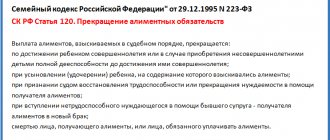A citizen under 18 years of age, just like any other adult Russian, can receive any gift free of charge, even such a large one as an apartment. At the same time, a minor, by law, does not have all the rights and responsibilities of an adult; therefore, an agreement to donate an apartment to a minor is drawn up taking into account some nuances.
Dear readers! Our articles talk about typical ways to resolve legal issues, but each case is unique. If you want to find out how to solve your particular problem, please use the online consultant form on the right or call. It's fast and free!
So, how to give an apartment to a minor child?
Since the child has limited legal capacity, all decisions that have legal consequences are made instead by his legal representative: a parent or guardian. It is he who puts his signature on all documents and acts on behalf and in the interests of the child. This applies to all cases where the minor is under 14 years of age.
After this age, the child receives a passport and can already perform certain actions with the knowledge of his legal representative. In particular, he can accept large property as a gift.
Simply put, he can sign the gift agreement as one of the parties, but his parent or guardian must sign next to it - this way they confirm that the transaction is being carried out under their control, and the interests of the child are not infringed in any way.
The concept and aspects of donation
The gift agreement is in written form or expressed in an oral agreement. The parties agree on the transfer of one property to another (Article 572 of the Civil Code of the Russian Federation). The citizen who makes the gift is called the donor, and the recipient is called the donee.
The deed of gift includes several groups of conditions:
| Criteria | Description |
| Essential | Requirements for deeds of gift are regulated by the Civil Code of the Russian Federation. It is necessary to indicate: the subject of the agreement, the promise of free transfer of property assets. If the items are missing from the document, then registration of the deed of gift will be refused. |
| Additional | Even if these conditions are not stated in the document, they must be met. Since they are provided for by regulations. For example, the agreement will take effect from the moment it is signed, unless otherwise stated in it. |
| Random | These items are not mandatory, but they can be included in the deed of gift with the consent of both parties. For example, a child will become the owner of a car only if he successfully graduates from a university. The donor can offer any conditions under this section. |
Donation can be made by both individuals and legal entities. The main feature of the transaction is its gratuitous nature. The recipient must not transfer anything for ownership of the gift.
Reference! If such conditions are identified in the contract, the transaction will be considered void (clause 1 of Article 572 of the Civil Code).
The donor can only be a legally capable person who has the right of ownership of the object. Even if he is a disabled person, the transaction can be carried out while maintaining legal capacity. This requirement is not imposed on the recipient.
It is important that the object be transferred immediately or after the occurrence of any event provided for in the contract (wedding, graduation from university). It is impossible to allow the use of property after the death of the donor, since the transaction will be considered void.
Before you issue a deed of gift for a child, it is worth checking whether this can be done. In accordance with Article 29 of the Civil Code of the Russian Federation, minors and minors can accept a gift with the permission of their parents or independently. This norm is valid if state registration of the object or notarization is not required (Articles 28, 26 of the Civil Code of the Russian Federation).
Methods for registering a deed of gift
You can draw up a contract for donating property to a minor with a notary or do without one by drawing up a document on the transaction yourself. If you decide to draw up a deed of gift yourself, you should know that the document is signed by both the donor and the recipient, as well as his official representative. The text of the document, written by hand, must contain information about the objects being donated, information about the documents establishing the right to them, as well as complete information about the donor and the person to whom he made the gift.
Attention! The gift deed itself has not been subject to registration since 2013!
If this is residential property, then it is subject to re-registration in the Rosreestr under the new owner. Along with the contract, the entire package of title documents for the property must be presented, as well as documents confirming the identities of the parties to the transaction.
A deed of gift drawn up by a notary is drawn up on a special form and contains, in addition to the information described above, information about the estimated value of the property. This is required in order to calculate the amount of the fee paid when certifying a transaction by a notary. The notary will also require a certificate of mental sanity of the donor.
Important! The authenticity of the document on donation of property is not required to be confirmed by a notary. It is wise to contact a notary if the donation is not made to immediate relatives. To avoid misunderstandings in the future with the donor’s relatives challenging property rights, it is better to insure such a transaction with a notarization.
Age of the recipient
There are several ages of recipients.
In each period, the transaction has some features. It is important to know at what age you can receive the gift.
- From birth to 14 years. The signing of the document for the minor is carried out by the parents. Registration is carried out in the presence of the owner of the object and representatives of the child.
- From 14 to 18 years old. Teenagers have the opportunity to sign the document independently. But they can do this only after receiving the written consent of the legal representative to carry out the procedure.
From the age of 18, a citizen is considered a full participant in the process. He will be able to independently carry out the procedure for obtaining the object.
Additional nuances
The initiators of the transaction are often grandparents who plan to transfer their property to their grandchildren during their lifetime. And in this case, the agreement is signed by the parents or other persons legally representing the interests of the minor.
Only children aged 14-18 years can refuse the gift..
In what cases is a challenge possible?
A deed of gift can be challenged not only by the donor, but also by other persons legally endowed with the corresponding rights. The donor can do this if the following conditions are met:
- the actions of the donee cause damage to property, or may lead to the complete loss of the object.
- When registering a deed of gift, actions of a criminal nature are carried out.
- After the transaction, living conditions worsen or health deteriorates.
Legal heirs can challenge the transaction if the donor has already died . But they also need to comply with certain conditions.
- If at the time of the transaction at least one of the parties did not have the official right to perform such actions.
- If the actions committed by the donee are criminal in nature.
Some state and municipal authorities may also challenge the legality of the transaction . This also applies to other representatives appointed by law.
The recipients also have the right to refuse the gift given to them. It is enough to put the refusal in writing and register it.
Contract form
Registration of a deed of gift for an apartment or a house, as well as for other property benefits, is carried out after drawing up an agreement between the parties.
The form of the document is not established at the legislative level. It must be drawn up in accordance with the general requirements for drawing up contracts. Article 574 of the Civil Code of the Russian Federation states that an agreement can be oral. But in some cases, a written form must be drawn up.
The following are the circumstances requiring the preparation of the document.
- Donation of an object worth more than 3 thousand rubles.
- Drawing up a deed of gift by a legal entity. With the participation of an organization, any transaction must be in writing.
- The promise of a gift in the future is drawn up in documentary form (clause 2 of Article 574 of the Civil Code). The consensual agreement specifies the object and the period of transfer.
- A donation agreement for an apartment, a house, or a share in an apartment is drawn up in writing. The procedure for registering an object is prescribed in Article 131 of the Civil Code of the Russian Federation.
- The document is prepared if the transaction is carried out with the assistance of a notary. He cannot verify a verbal commitment.
Citizens carrying out the donation procedure can independently or a sample document and fill it out with their own data or seek the help of our on-duty lawyer.
Download the gift agreement for a minor child (sample)
How to give movable property to a child
Movable property includes cars, motorcycles, equipment, money, shares, securities, etc.
When donating shares, the agreement must be drawn up in writing. The agreement is transferred to the registrar of shares to formalize the transfer of rights. There is no need to involve a notary or guardianship authorities.
A promise to make a gift in the future must be made in writing. The agreement should indicate the participants, the donor’s desire to transfer the gift and the recipient’s consent to accept it. Describe the item of donation in as much detail as possible, indicating its characteristics and features.
When donating a vehicle, you will also need a written donation agreement to register the vehicle. A written donation agreement will be the basis for entering information about the new owner into the vehicle passport.
Features of giving to children
Property from the mother or father is transferred to the child free of charge.
Therefore, this type of transaction is especially popular among children and parents. After signing the document, the object becomes the property of the child. But before selling the property, the recipient must reach the age of majority. The rule applies in the absence of special instructions in the contract. For example, property can only be transferred after marriage or graduation.
Children are close relatives to their parents. In this case, the mother and father are considered legal representatives. Therefore, they have the right to participate both as donors and as recipients of the gift on behalf of the child.
In accordance with paragraphs. 2 p. 2 art. 28 of the Civil Code, a child can independently receive only a gift that does not require state registration or certification from a notary. If these procedures are carried out, then a legal representative must be present and give written consent (Clause 1, Article 26 of the Civil Code). If a child receives property from his father, then it is accepted by the mother.
Sometimes the procedure is performed in single-parent families, which often happens after divorce or the death of one parent. In this case, one representative of the child cannot be both the donor and the recipient. You will need to contact the guardianship authorities to obtain permission to represent the interests of the minor to another citizen.
Arbitrage practice
Typically, deeds of gift are contested by relatives of the donors, citing as grounds the donor’s misleading the recipient when signing the document, or the execution of a deed under pressure. The donors themselves also have the right to cancel the transaction. In both cases, to satisfy the claim, it is enough to provide evidence confirming the existence of grounds.
Here are some examples of decisions made in real cases where people managed to get the DD abolished through the courts:
Decision No. 2-3001/2019 2-3001/2019~M-2471/2019 M-2471/2019 dated June 27, 2021 in case No. 2-3001/2019;
Decision No. 2-492/2019 2-492/2019~M-295/2019 M-295/2019 dated June 24, 2021 in case No. 2-492/2019; Decision No. 2-5766/2019 2-5766/2019~M 0-4649/2019 M 0-4649/2019 dated June 25, 2021 in case No. 2-5766/2019.
Important!
After the DD is declared invalid, the ownership right is returned to the donor. The donee (defendant) has the right to challenge the court decision before it enters into legal force within 30 days from the date of adoption in final form.
Do I need to get my spouse's consent?
The rights of parents to real estate are prescribed in Article 35 of the RF IC.
It notes that if acquired during marriage, it becomes community property. And one party has no right to dispose of this property without the consent of the other. If the object was transferred to the spouse before marriage or before divorce as a gift, then it is considered individual property. And every citizen has the right to dispose of it at his own discretion. Such an object is not divided during a divorce and can be transferred to the child free of charge. This problem is especially often faced by parents who donate real estate to a child from their first marriage upon entering into a new union.
What happens if you donate an apartment without the bank’s knowledge?
Is it possible to donate a home without the knowledge of the financial company? Perhaps the borrower will somehow be able to pull off such a transaction, but this will immediately be followed by the actions of the financial company.
- A lawsuit. The bank, through legal proceedings and filing a claim in court, has the right to challenge the deed of gift. And the financial company will be right in this case.
- The bank may also require that loan obligations be fulfilled ahead of schedule. The bank has the right to demand from the borrower that the remaining debt be paid immediately. The bank may also demand that the home be sold regardless of who exactly is its owner.
So, as you probably already understood, it is very difficult to donate housing that is under a mortgage. This can only be done in the following cases:
- If the debt is repaid early.
- If the bank has approved the transaction.
In addition to the fact that you need to obtain the appropriate consent from the bank, the procedure for donating a mortgage is quite complex.
After all, in most cases, the borrower cannot immediately repay the debt, and financial companies do not want to make such transactions.
Donation procedure
Registration of a gift to a child is carried out according to the standard scheme.
But there are some differences in the procedure.
- Collection of documents. It is important that the title papers for the property are available. You also need to assemble a complete kit and required permits.
- Drawing up a deed of gift. The document includes standard details, conditions, the transferred object, rights and obligations of the parties, and liability. The data of legal representatives and specialists from guardianship authorities are also noted.
- Signing the contract. A citizen, after reaching 14 years of age, can independently sign an agreement if certification of the document and registration of the transaction are not required. If the procedure is carried out at a notary, signatures are placed by the parents.
- Transfer of property. The object can be transferred immediately after signing the contract or in the future, subject to appropriate conditions. A transfer deed is drawn up, which reflects information about the transaction.
- State registration of the object. The legal representative will carry out the procedure in Rosreestr or the MFC in the presence of the minor.
Reasons for refusal to register transfer of rights
A notary or state registrar can refuse to formalize an agreement.
Reasons for refusal may be:
- the donor is under 14 years of age;
- the donor is incapacitated;
- there is no consent of the spouse to the transaction when donating common property;
- The representative's power of attorney does not indicate what is being given or to whom.
There may be other reasons. The refusal will state why the registration was suspended, for what period and what needs to be corrected or reported. After correction, registration will be completed.
List of documents
It is important to know what documents are needed to transfer an object as a gift.
The list includes:
- passports of legal representatives;
- birth certificate of a minor;
- permission from the guardianship authorities if another relative is present during the procedure;
- power of attorney from a representative of the guardianship authorities (if he is involved);
- notarial permission of the legal representative to make a donation;
- title papers for the object;
- a report assessing the value of the gift;
- extracts from the BTI upon transfer of real estate.
The list of documents may vary depending on the object being transferred and the age of the child.
How much does the procedure cost?
You can answer the question of how much it costs to formalize a deed of gift by clarifying the method of conducting the transaction. If a notary is involved in the procedure, the cost of services varies depending on:
- the region where the transaction is taking place;
- type of property.
The amount can range from 8,000 to 11,000 rubles.
An additional state fee is paid. Its size varies from 0.3 to 0.5% of the transaction amount. If the object is transferred between close relatives, in accordance with Article Art. 22.1 of the Fundamentals of the legislation of the Russian Federation on notaries, a special notarial tariff is applied.
Lawyer's answers to frequently asked questions
I want to give my five-year-old niece an apartment. Should I include my niece's details in the contract?
The agreement on the part of the donee must indicate one of the parents acting in the interests of his young daughter. And the parent of the donee will sign the agreement, but your niece will become the owner of the apartment.
I decided to give the apartment to my sister. We would like to draw up a donation agreement with a notary. The cost of the apartment is two million rubles. What notary fee will I need to pay?
Since the gift is worth up to 10 million and you are not close relatives, the calculation will be according to the formula:
7000 + 0.002 × (2,000,000 − 1,000,000) = 9,000 rubles.
I will give the apartment to my granddaughter. I have no other place to live. Can I live in an apartment after signing a donation agreement?
You can stipulate this point in the contract. However, when your granddaughter decides to sell or rent out the apartment, it will be difficult for you to prove your right not to leave.
If you want to transfer your apartment to your granddaughter, and in return receive care and support in old age, draw up a rental agreement with lifetime maintenance. If you are thinking about such an agreement, fill out the application form below or write to the specialist on duty on the website and get advice on your issue completely free of charge.
Tax payment
When an object is donated, the recipient will have income.
Its size is determined based on the market value of the property. The fee is 13% of this amount if real estate or a vehicle has been transferred. Even if the gift is made in favor of a minor, tax must be paid. In accordance with paragraph 3 of Art. 28 of the Civil Code it is submitted by a legal representative.
Attention! Close relatives are exempt from taxation. There is no need to pay a fee if the apartment was transferred by parents or grandparents.
Property tax is also paid. In accordance with Article 406 of the Tax Code of the Russian Federation, the amount will be from 0.1 to 2% of the cost of the object.
Is it possible to cancel the deal?
Before making a donation, it is worth finding out whether the deed of gift can be challenged.
In accordance with Article 578 of the Civil Code of the Russian Federation, this can be done within 3 years after signing the agreement. But the citizen must have compelling reasons for cancellation.
These may be recognized as:
- violation of the law during the transaction;
- careless attitude of the recipient towards the transferred object, which leads to a violation of its integrity;
- deterioration in the donor’s standard of living after the procedure;
- infringement of the rights of a minor.
Refusal of a gift can also be made by the recipient himself.
Responsibility for alienation of property from minors
If a violation is detected on the part of the guardians, the transaction will be declared illegal and the property will be returned to the owner. Moreover, if guardians not only neglected routine rules, but also received benefits, then they may face criminal liability.
So, an attempt to donate a share in housing on behalf of a child is almost guaranteed to fail. Moreover, if we are talking about a minor – under fourteen years old – citizen.
If such an action is really necessary, it is better to wait until the person reaches the age of majority and his informed consent to donate part of his property rights. This is guaranteed to save guardians from unnecessary questions from law enforcement officers.
Pros and cons of giving
There are various pros and cons of giving.
The positive points include the following points:
- carried out faster than other types of transactions;
- no conditions can be imposed on the recipient to receive the gift;
- challenging is difficult;
- It is possible to donate the whole object or part of it.
But there are also negative points:
- Once registered, the contract cannot be canceled, so the donor must think about the consequences in advance;
- a minor may not dispose of the gift until he or she reaches adulthood;
- The guardianship authorities will check the purity of the transaction so that the rights of the child are not infringed.
A gift deed is a convenient way to transfer rights to real estate. It has an unconditional character. If the transaction is made between close relatives, payment of taxes and fees is not required. For a child before reaching adulthood, the procedure is carried out by parents.









